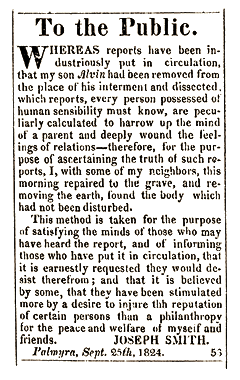why me wrote:Yong Xi wrote:Had Joseph Smith been trustworthy, he would not have been successful. His power lie in attracting the credulous.
Oh I see, so all the Mormons at that time were credulous...with monkey brains.
No more than all of the clients of Bernie Madoff had monkey brains.
The bottom line is that good conmen can con really smart people some of the time. That's the mark of a good conman. But look at the history of apostasy in the early church and you will see that a lot of people who initially "fell for it" came to realize what was going on, and rebelled against it.
Of course, to TBMs the early apostates were just servants of Satan, so whatever.
I don't think so. Now lets look at it this way: People flocked to the Mormon church not because of Joseph Smith but because of the message.
Did everyone who lost money with Bernie Madoff meet the man personally before "investing" with him? Or was it the "message" they were attracted to? And the word of mouth from others who had fallen for his lies helped sell it to new marks?
No one in Europe who came to the america to be with the saints ever met Joseph Smith. But they did meet the message that the church had.
And people the world over fall for the Jehovah's Witnesses, Ekenkar, various Evangelical Christian ministries, Amway, Nani Juice, and a metric billion other scams and head-f*cks on offer. What's your point, that Mormons and Mormons-to-be are just as credulous as everyone else in the world? I guess that would be expected, seeing as Mormonism isn't really anything special or unique - it's just one more example from an entire family, or even genus of such human-created entities or social organizations.
Also, we also need to remember that the church was not just about Joseph Smith. It was also about a host of other people involved. Emma for one. She was a stalwart in the faith. Yes, she had her disagreements with Joseph Smith but she was faithful to the church and oversaw many women in the faith. And she spoke at meetings and was responsible I am sure for cementing the faith of other members. Was she trustworthy?
William Law didn't think so, but I'm willing to cut Emma a little more slack and assume that however she turned out to be was in many ways just her reaction to living with Joseph Smith and his lying manipulative bullsh*t for so many years, ie: she was a product of her marriage.
And so, I have to disagree with you. But it would be interesting to know the IQ level of the early members. I think that we would be pleasantly surprised that it was high.
I see no evidence to suggest that the IQs of early members would have been high. As the church got larger and larger, I'd venture to guess that the IQ distribution within the church would probably have resembled the IQ distribution of the country, or even world, at large. Or perhaps one could compare the IQ distribution amongst the population of the early LDS church with the IQ distribution of the memberships of other new religious movements, to compare apples to apples.
It was a different era, one where we didn't understand the universe as well as we understand it now, and yet human beings are inventive and curious, and thirst for answers, and so people were probably more disposed to believe in things that we today would find hard to believe. As our collective knowledge- and experience bases have enlarged since then, the ability of those "in the know" to resist beliefs unsupportable by reality is hopefully improved.


